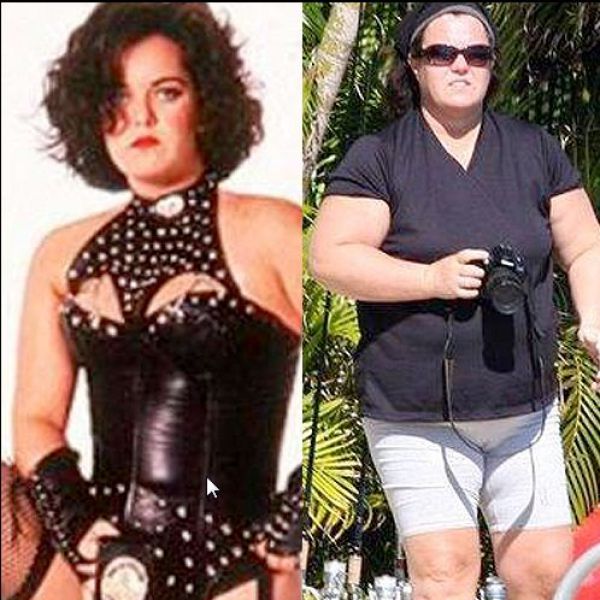- Joined
- Jul 8, 2012
- Messages
- 47,571
- Reaction score
- 16,958
- Gender
- Female
- Political Leaning
- Moderate
Okay, but that doesn't answer my question. Do you confront fat people when you see them?
Okay, but that doesn't answer my question. Do you confront fat people when you see them?
I told my boss to his face "You know, with your body type, well, we have different body types."
I also have told several girls that I'm sorry you're not in shape enough for me and asked them to leave. They left.
So yeah, I do.
Oh my, so impressive. :lol:
I have to admit, considering my boss doesn't have the ability to fire me..
It was absolutely badass. His blubbery face went so red. It was great. I loved it.
=)
I'm sorry. I think you are wrong. We've had a similar program here in Massachusetts that went into effect in 2006 I believe. I don't smoke, but I have also Never been asked if I smoke. My premiums are not any higher this year than last either. They are exactly the same.
The way it works is everyone has to buy insurance. If you cannot afford insurance, insurance will be provided for you through the state's various programs, depending upon where you fall in the poverty guidelines. Those who do NOT buy insurance are punished on their tax returns by a certain percentage (I know this because I had to pay a $600 penalty on my taxes one year when I did not purchase health insurance).
The idea is that EVERYONE participates to bring premiums down for everyone.
So, if I understand you correctly, the charts are infallible and should be followed to the letter... or number. There are no legitimate mitigating factors for anybody. One either falls in the good zone, or they don't. Period. Am I interpreting your statement correctly?
Should medically judged fat people pay higher medical costs?





The question is vague.
Higher medical costs meaning what?
Higher insurance premiums? The answer is DEFINITELY 'yes'...obviously if you are fat then your future health costs will probably be far higher then someone who is fit.
The question is vague.
Higher medical costs meaning what?
Higher insurance premiums? The answer is DEFINITELY 'yes'...obviously if you are fat then your future health costs will probably be far higher then someone who is fit.
Higher costs for medical procedures/drugs? Obviously not.
Being overweight doesnt always mean that insurances will have to fork out more money. Future health costs dont even exist if the person dies early. Or perhaps becomes fit?
Being overweight doesnt always mean that insurances will have to fork out more money. Future health costs dont even exist if the person dies early. Or perhaps becomes fit?
If the person dies early or becomes fit, then their medical insurance rate will go down.
Maybe even down to zero.
They have higher life insurance rates, not higher health insurance rates.Are body mass indexes not already taken into consideration? Like smoking and drinking? Such people already have higher rates, at least in some policies.
They have higher life insurance rates, not higher health insurance rates.
I was diagnosed with Type 2 not long ago. Here's my history:
1. My father was diagnosed with diabetes in 1969. Heavily insulin dependant.
2. I was diagnosed with Gestational Diabetes with all of my pregnancies, and was insulin dependent with all 3.
3. I was told by my OB that given my family history as well as the Gestational Diabetes, I had a 90% change of developing Type 2 by the time I was 50.
4. I have been underweight most of my life due to hyperthyroidism which I was diagnosed with in the early 1990s.
I am not heavy (just the opposite), I watch what I eat, I exercise religiously, and I still went full out diabtes which couldn't be controlled with diet & exercise (I am now on Lantus insulin).
You are 100% spot on that Type 2 can be genetic, and the realilty is, my diabetes during pregnancy all but assured the reality of me ending up as a diabetic.
Are body mass indexes not already taken into consideration? Like smoking and drinking? Such people already have higher rates, at least in some policies.
Being overweight doesnt always mean that insurances will have to fork out more money. Future health costs dont even exist if the person dies early. Or perhaps becomes fit?
Yes, but Obamacare rules don't allow health insurers to charge obese people more. It makes no sense to me.If they're more likely to die, aren't they more likely to need health care as well?
Same thing with smoking. Smokers don't always get smoking related illnesses, but yet they have to pay more. If the obese person gets fit, then they wouldn't be obese and wouldn't pay more.
If the person dies early or becomes fit, then their medical insurance rate will go down.
Maybe even down to zero.
Granted, clinical obesity does take years off of life expectancy, but it only averages 3 years. The problem is that for decades prior, clinical obesity results in much higher healthcare costs due to increased heart disease rates, increased cancer rates, joint deterioration - in particular knee joint degeneration, and mobility issues.
An active person with a health weight and good diet doesn't typically live more than a few years longer than someone that is obese. However, their quality of life in the later decades of their life is significantly better and they typically don't have the chronic conditions that are extremely expensive to treat.
Study: Obesity Responsible for 18 Percent of U.S. Deaths “The impact of obesity on U.S. mortality appears somewhat more serious than suggested by existing findings,”
BMI: Bogus Measurement or Valid Health Indicator? You Decide | The Daily PT
"The BMI has actually been referred to as “mathematical snake oil”. Just like snake oil, it’s not a one size fits all formula. In fact, some would argue that it’s not an effective formula at all."
Why BMI is inaccurate and misleading - Medical News Today
"Every few months the same comment is made by experts "BMI is flawed". The news hits the headlines, everybody agrees, and then all goes quiet for a while."
"BMI was devised in the 1830s by Lambert Adolphe Jacques Quetelet (1796-1874), a Belgian mathematician, sociologist, statistician and astronomer."
Being medically overweight or obese is actually rather subjective. Couple that with the fact that it is also subjective whether extra weight in ALL cases is unhealthy then you end up with charging someone more for a service based on subjective data is a scam. True that some people who are what is considered overweight are unhealthy but then so are people who are considered normal weight. So far in this thread proponents of charging fat people more money have only been pointing at people because they deemed them fat. Look at all those silly photos shared that accused people of being fat. It was like grade school bullies gone amuck in this thread. They assume that everyone that they deem to be fat are the cause of rising healthcare insurance rates and rising medical costs.
Some people are fat some people are not. Many who are fat are unhealthy many who are not fat are also unhealthy. Should people be fat? I agree that being fat is a bad choice (if indeed its a choice and not a symptom). No doubt being obese for most people is unhealthy. There is plenty of data that shows it. But being underweight is unhealthy as well. Also many other factors indicate a person is unhealthy. Subjective...
But as far as generalizing the public and deeming fat people the cause of rising fees and charges for medical care and insurance policies is a witch hunt. It boils down to the philosophy of insurance rather than direct contracts or direct services. A third man between those seeking medical care and those providing it. Insurance is a collective pool of money that is supposed to pay for medical care that would not always be affordable for most people. It counts on there being more people not using insurance funds than those using it. The use of the funds is what is important not the conditions that could cause more use of funds. preventive care is awesome but then running to the doctor because you have a splinter or any of the many pathetic things that people run to the doctor for and get a script for a drug that they dont need is probably a larger suck on those funds than fat people.
